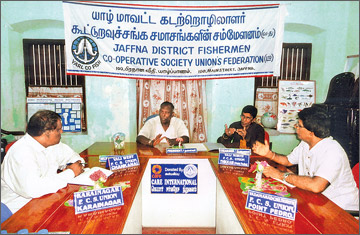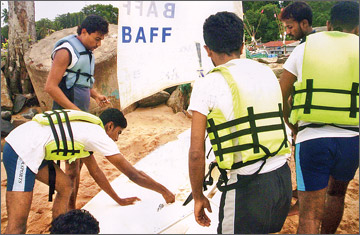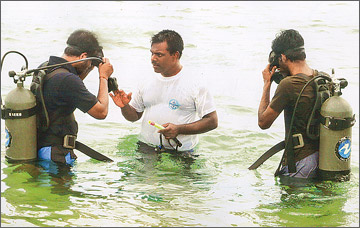Ocean abounds with a variety of resources
By L.S. Ananda WEDAARACHCHI
 |
 |
|
Youth Affairs Minister Dullas Alahapperuma |
Prof.
Ranjith Senaratna |
Sri Lanka has an oceanic area equivalent to nearly eight times its
land mass, which is likely to increase substantially in the future as
per the UN convention of the law of the sea. The ocean including its
seabed abouds with a variety of biological chemical and physical
resources of great economic value, which hitherto remain almost
unexplored and untapped.
Sustainable management and utilisation of the rich and huge marine
resource base hold great promise for the economic development of Sri
Lanka - through creation of new enterprises, and industries generation
of employment and earning valuable foreign exchange.
Ocean University chairman Professor Ranjith Senaratne said that
recognising the importance of human resources development in the
fisheries sector to the national economy and to maximising the
productivity of marine and inland water resources are vital. Ocean
University - the National Institute of Fisheries and Nautical
Engineering was set up in 1999 by President Mahinda Rajapaksa as the
then Minister of Fisheries and Aquatic Resources.
The scope of the objectives and the functions of the Ocean University
have been widened after the eradication of LTTE terrorism.

Ocean University academics and the Chairman Prof. Ranjith
Senaratna meet Jaffna Fishery Co-operative Society officials. |

Undergraduates at the fishery boatyard |

Students are being trained in underwater welding work |
The Northern and Eastern sea is identified as full of natural
resources useful for training, research, fishing and oil exploration
activities, under the guidance of Youth Affairs Minister Dullas
Alahapperuma, Ocean University is geared to meet the increasing demands
of the fisheries and marine sector, the professor said.
"Ocean University is not just another University. Our aim is to
develop it as a community oriented University - Comm-University. The
fishing community and people who earn their livelihood from the sea will
be the direct beneficiaries. The development of the Port sector is bound
to create more job opportunities he said.
He said: we have already commenced degree programs on Navigation,
international transport-management, Harbour Management, Coastal Zone
Management and Diplomas on Marine Engine Technology, Fibreglass
Technology, Computer Science, Certificate Courses in Underwater Welding,
Refrigeration and Air Conditioning, Marine Welding Technology, out-board
motor engine, repair and maintenance, marine engine technology,
Swimming, life Saving, Scuba diving, Fishing Gear Technology.
The B.Sc degree programs are on fisheries and marine science, marine
engineering and naval architecture.
Professor Ranjith Senaratne said that steps have been taken to
improve relations with the advanced ocean universities in Europe.
Sri Lanka and Sweeden have agreed to sign a memorandum of
understanding between Sri Lankan Ocean University and Sweedish world
Maritime University to launch joint educational training and research
programs during the discussions Minister Dullas Alahapperuma and Foreign
Secretary Romesh Jayasingha had with Sweedish authorities recently.
The Ocean University will work in close collaboration with the
Universities in Iceland, Norway, Canada, New Zealand and Japan for the
development of maritime and fisheries studies the professor said.
He said that underwater safari tours are being introduced in Europe
for highend tourists providing access to beautiful corals, sea plants,
beautiful ornamental fish. The Ocean University is exploring the
possibility of introducing them into the eastern and northern seas with
foreign assistance, the professor said.
Theoretical and practical lectures and the training for the Diploma
and Degree programme of the Ocean University are being conducted in
Mattakkuliya, Negombo, Tangalle, Kalutara, Galle, Trincomalee,
Batticaloa, and Jaffna campuses. The students who have passed in the GCE
Advanced level science and maths stream with three passes are eligible
to qualify for admission to the Ocean University. At present over 700
male and female students have enroled in the Ocean University.
Tangalle Fisheries and Naval Engineering Faculty Deputy Director
Rashinta Tushara said that their students are fully trained to handle
underwater welding work.
One third of the ship's body is underwater when ships are anchored.
Repairs to ships can be successfully handled by those trained by us for
such skills, he said.
Tangalle National Fisheries and Naval Engineering Faculty Senior
Lecturer N.P.J. Pushpita said that advanced technology is being
introduced to traditional fishing through their programs "Fishermen face
enormous difficulties when their batteries go out of order after a few
weeks in the deep sea and lose contact with their families. The ships
are also unable to identify the multi-day fishing boats when they are
without power. The solar power for multi-day fishing boats was
introduced at Tangalle recently to overcome this difficulty", Puhspita
said.
At present there are thousands of unskilled unemployed youth in the
country. The Ocean University could train our youth for various skills
such as Fisheries, Navigation, Coastal Zone Management and International
Transport Management and Sea Tourism. |

